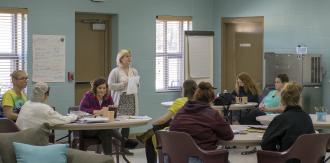State's First All-Women's Supervision Center Readies Missourians for Success
In February 2019, when the Probation & Parole District 26 Fulton Community Supervision Center welcomed the inaugural class into its women’s program, participants were not optimistic.
“I came here broken, and I didn’t believe I could ever feel anything else,” Dana Hebblethwaite, 30, recalled. “When I first walked into this building, I was such a wreck that I didn’t even notice it,” said Desiree Stone, 19. “I almost thought it was the end of the world,” said 43-year-old Tammy Boyt, whose participation meant missing the birth of her first grandchild.
One-hundred-twenty days later, at a May 16, 2019, graduation ceremony, the first seven women to complete the program addressed a crowd of peers, family members and corrections staff packed into the center’s community room to celebrate their accomplishment. Taking turns at the lectern, they described their new state of mind.
“This amazing program has opened my eyes completely; I’m finally learning my self-worth,” Stone told the crowd. “Spiritually I feel free, and I’m hanging onto that with all of my might,” Hebblethwaite said. Boyt: “I’m learning how to live and be happy again.”
For the first time in Missouri Department of Corrections history, women on probation or parole can get the support they need in an all-women’s residential center. The freshly remodeled Fulton Community Supervision Center provides gender-responsive and trauma-informed approaches to better serve women under supervision in a rehabilitative environment.
In a four-phase program tailored to meet each resident’s assessed needs, women tackle intensive employment-readiness prep work; on-site substance use disorder services; cognitive interventions; housing plans; and family reunification. They learn basic life skills such as goal-setting and meal preparation. They work with counselors and advisers from organizations such as Compass Health Network, the Division of Workforce Development and University of Missouri Extension. Staff invest in ensuring the women have the tools they need to change their lives.
“Your past does not define who you are,” Probation & Parole Officer Shari Lockett-Hamilton told the graduates. “You can make your life what you want it to be.”
In 2017, Missouri had the country’s fastest-growing population of incarcerated women, more than 90 percent of whom were entering prison for technical probation or parole violations or for court-ordered substance use treatment — not for new crimes.
Incarcerated women are far more likely than their male counterparts to have experienced interpersonal violence and trauma as well as post-traumatic stress. Providing services tailored to women’s needs is essential to breaking the cycle, says Shelia Thompson, a counselor in the center who knows the system from both sides.
“This process of helping the female population to understand some of the unique issues that only the female population has to go through is a process that began long ago,” said Thompson. “I have been one of these women sitting here. I know that anything and everything is possible.”


